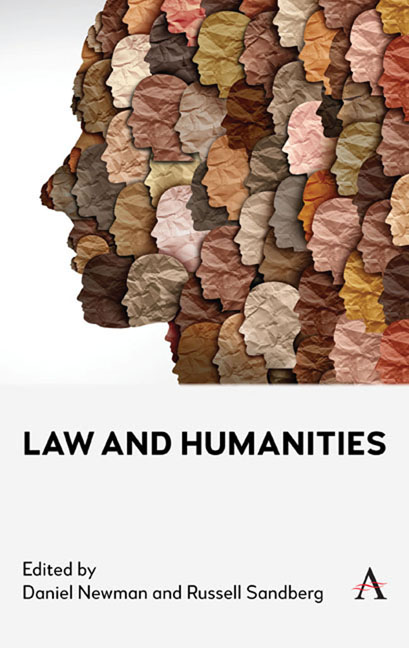Book contents
- Frontmatter
- Contents
- Preface
- List of Contributors
- Chapter One Introducing Law and Humanities
- Chapter Two Law and Archaeology
- Chapter Three Law and Comics/Graphic Justice
- Chapter Four Law and Film
- Chapter Five Law and Geography
- Chapter Six Law and History
- Chapter Seven Law and Literature
- Chapter Eight Law and Philosophy
- Chapter Nine Law and Popular Music
- Chapter Ten Law and Religion
- Chapter Eleven Law and Television
- Chapter Twelve Law and Theatre
- Chapter Thirteen Law and Theology
- Chapter Fourteen Law and Video Games
- Chapter Fifteen Conclusion: Subverting the Law and Humanities Canon
- Index
Chapter Fifteen - Conclusion: Subverting the Law and Humanities Canon
Published online by Cambridge University Press: 27 March 2024
- Frontmatter
- Contents
- Preface
- List of Contributors
- Chapter One Introducing Law and Humanities
- Chapter Two Law and Archaeology
- Chapter Three Law and Comics/Graphic Justice
- Chapter Four Law and Film
- Chapter Five Law and Geography
- Chapter Six Law and History
- Chapter Seven Law and Literature
- Chapter Eight Law and Philosophy
- Chapter Nine Law and Popular Music
- Chapter Ten Law and Religion
- Chapter Eleven Law and Television
- Chapter Twelve Law and Theatre
- Chapter Thirteen Law and Theology
- Chapter Fourteen Law and Video Games
- Chapter Fifteen Conclusion: Subverting the Law and Humanities Canon
- Index
Summary
Part I: On the Question of Canonicity
One question that dominated many of the papers and conversations that took place at the 25th anniversary of the Association for the Study of Law, Culture and Humanities (LCH) annual conference, hosted by the University of Toronto in Canada on 22–23 June 2023, was whether there is (or should be) a law and humanities canon? I spoke directly to this question on a panel with James Martel and Hyo Yoon Kang on the first morning of the conference. This question was picked up by many others during the two days, including past LCH president Susan Heinzelman in the plenary session entitled ‘LCH at 25: Looking Back, Thinking Forward’.
The question of canonicity as it relates to law and humanities scholarship is very relevant to this current collection of essays edited by Newman and Sandberg as it attempts to add to, or intervene into, the established law and humanities canon (if there is one), and thus must be interrogated for the message and power it holds in that regard. In my conference paper, which closely followed the argument set out in my published Commentary, I imagined law and humanities not as a ‘canon’ per se but as a ‘field without a canon’, or a canon that resists canonisation. I argued that arts and humanities–based practices utilised in legal research and teaching expose the law and humanities ‘canon’ to its dual (and somewhat contradictory) nature, as that which continually strains towards a pre-established archive, but must also leap ahead fearlessly to properly defy disciplinary boundaries and move the field beyond siloed thinking. This, to my mind, is one of the preliminary aims of law and humanities interdisciplinary scholarship and pedagogy. These practices consist not of a stable collection of set texts but instead signify a process of experimentation that is ever in flux and alive to possibility. It is this process of discovering new arts and humanities–based practices that ensures law and humanities remains a vibrant, yet ever-changing, field for years to come.
Canonisation, in its establishment of a field of intellectual thought that defines its parameters or the importance of certain texts and core issues at stake, invites community and consensus.
- Type
- Chapter
- Information
- Law and Humanities , pp. 225 - 232Publisher: Anthem PressPrint publication year: 2024

